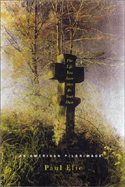
Book Review
by Judy Alexander, November 9, 2003

The Life You Save May Be Your Own
An American Pilgrimage
by Paul Elie
Farrar, Straus and Giroux, 554 pages, $27 US,
ISBN: 0-374-25680-2
The Life You Save May Be Your Own describes the spiritual and artistic journeys of four Catholic writers: Flannery O'Connor, Thomas Merton, Dorothy Day, and Walker Percy.
As an aspiring novelist who believes in Jesus, I was anxious to read this book, hoping to find role models. Even though the book was thoroughly researched and well-written, I was initially disappointed:
- The language used in this collected biographies seemed too cerebral and aloof, with insufficient dramatization of the emotional upheavals in the subjects' lives. Because the lives of writers, and Christians, are filled with doubt and discouragement, I wanted to find out what buoyed up someone who'd chosen both of these faith-intensive paths simultaneously.
- The conversion scenes were anticlimatic, following long discussions of the books the characters had read. (The author used this approach because the subjects had "read their way to God.")
- The narrative was disjointed, with the four biographies alternating every page or two.
- The four subjects were initially people that I couldn't relate to: born to wealth and privilege and the best education, with the luxury of time and money to be self-obsessive, or conversely (in Dorothy Day's situation), give themselves entirely to the masses. Either way, my first impression was that they were free of the prosaic struggle that artists like me have: balancing the needs of a spouse, children, and a day job with the personal need for time and space to explore their art and relationship with God.
But I gave the book another try, and within 100 pages, I'd grown to thoroughly love this book. I now I find myself returning again and again to the many passages I've underlined for insight and encouragement in both the spiritual and artistic walks.
The book's subtitle: An American Pilgrimage, reflects the book's emphasis on the "American Catholic" experience and the development of a group of "American Catholic writers" (versus the already established European Catholic writers, such as Graham Greene and Evelyn Waugh). Because the book focuses on the subjects' reading and writing as a means of spiritual discovery, I thought a better subtitle would be "a spiritual and artistic pilgrimage."
The book's subjects, who later became recognized as both literary and spiritual giants, experienced the same struggles, both professionally and spiritually, that I have. I became totally engrossed in reading how these ordinary people rose to the occasion when faced with life's challenges, or at times failed life's tests, like we all do:
- Dorothy Day tried to balance single-motherhood with intense social activism, often at the expense of nurturing her own daughter.
- Thomas Merton was inwardly focused to the point of self-obsession.
- Flannery O'Connor didn't fit in with the intellectuals of New York, but conversely, she cringed when she imagined what Christian woman in her home state of Georgia would think of her writing.
- Walker Percy's insisted on weaving deep philosophical ideas into his fiction, even though these ideas weighed down his storytelling.
As I read on, the stories of these writers' lives became less cerebral and more emotionally rich. Although not a Catholic myself, I read with interest how they came to call themselves Catholics:
- Thomas Merton sinned his way to God.
- Dorothy Day replaced communism with Catholicism.
- Walker Percy escaped the suicidal history of his family.
- Flannery O'Connor was a "cradle Catholic," but her faith was tried when she tried to live with lupus, which had claimed her dad's life and would soon claim hers.
As with their spiritual walk, the subjects viewed writing as an act of discovery, something to be pursued as an act of faith. This book is not designed to show us what good personal lives these people had (they didn't), but rather to show how they, after deciding to believe in God, they used writing to draw closer to God and to understand themselves better.
The four subjects had four different lifestyles:
- Monk - Thomas Merton explored his own internal world and personal relationship with God.
- Activist - Dorothy Day tried to save all the poor and downtrodden in New York.
- Family man - Walker Percy went though the home-life cycles of the common man, from marriage to parenting to grandparenting.
- Outsider - Flannery O'Connor might have wanted a family, but because of shyness and illness, never entered into a marriage match and lived instead with her mother
These lifestyles parallel the competing aspects of most writers:
- a monk (the act of writing requires solitude)
- an activist (claiming time for oneself sometimes requires some uprising)
- a family member (even those who don't marry usually have some extended family members who need their time)
- an
outsider (it's been claimed that most writers are outsiders, and that's
why we feel the urge to write.)
These writers' faith seemed to ground them, saving them from the flightiness that some artists are noted for. They were able to live in one place during their adult years (most had traveled as younger people) in a way that some restless artists never can. They were people of conviction and perseverance. They all weathered setbacks and self-doubt.
The Life You Save May Be Your Own: An American Pilgrimage captures the reading, writing, and spiritual journey of four early twentieth century literary Christians. That these four are flawed humans in need to God's grace gives hope to the rest of us who aspire to grow as they did in both literary skills and spiritual understanding.